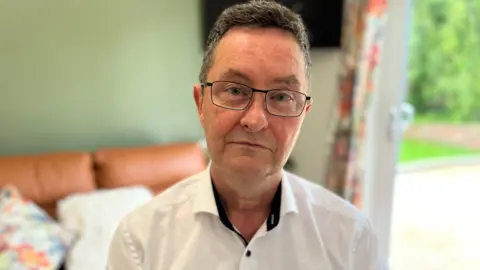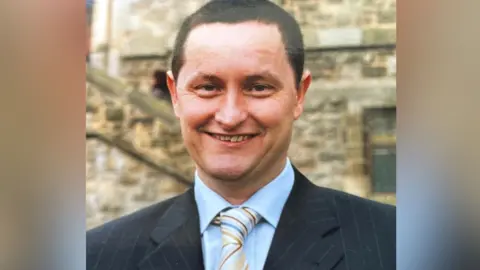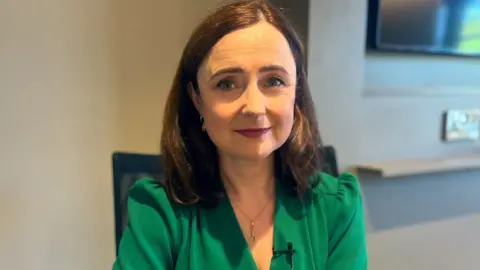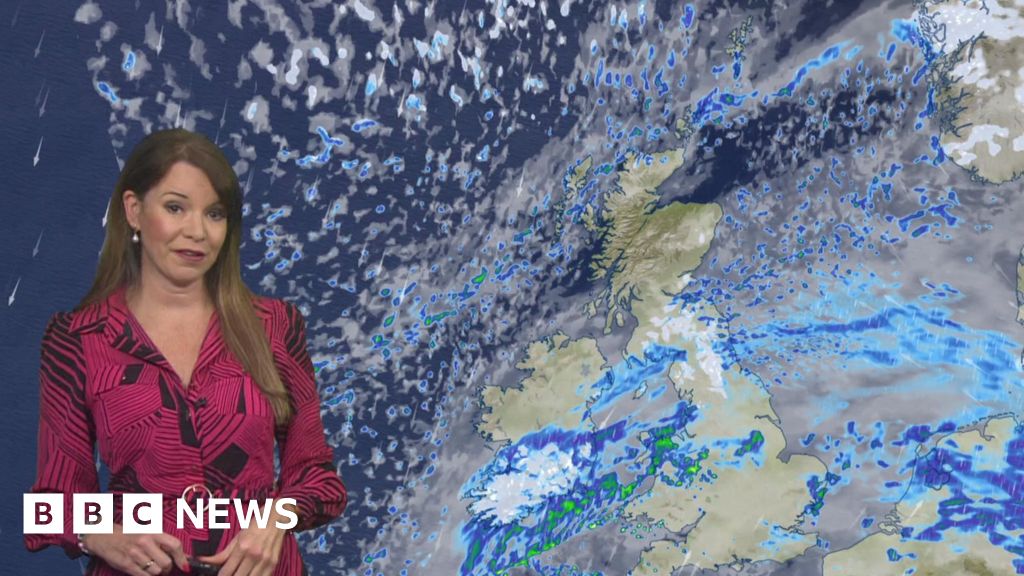
 BBC
BBC
John Kelly was driving to Dublin for a work meeting when he began to feel a tightness in his chest
"I had to pull the car over and phone emergency services, and I just thought this is it; I’m having a heart attack.”
John Kelly was driving to Dublin for work when he felt a tightness in his chest and pins and needles in his arm.
He called an ambulance and spent the next three days in the hospital for extensive tests, but these all came back clear.
“I was visited by a doctor who said the problem wasn’t with my heart," he said.
"When I asked what the problem was, he pointed to my head.”

 John Kelly
John Kelly
By the early 2000s, the Dungannon-born businessman had spent most of his career in the corporate world
John had experienced a severe panic attack.
Previously, the Dungannon-born businessman spent most of his career in the corporate world, occupying a senior position at a soft drinks company.
In the early 2000s, he started his own sales training business, and soon after this, his symptoms of anxiety began.
“I had been self-employed for a few years, and I thought I was doing OK; I had a nice house, loving family, but I suppose work was getting increasingly pressurised.
“One day, I just remember feeling like this fog on my brain and not understanding what it was, but I was still able to function."
A few days later, John had his first panic attack.
Therapy
John was eventually referred by his GP for cognitive behavioural therapy (CBT).
It is an NHS-approved talking therapy that can help you manage problems by changing the way you think and behave.
John described this as the start of his recovery.
"I would use the analogy of being in a boat that is leaking, and then you’re given the right tools.
"This wonderful bucket that helps you empty the boat of some of that water, but the boat was still leaking."
John waited several months for his first CBT appointment through the NHS and was given an initial six sessions.
He later paid for further sessions through the private sector.
John said CBT was the starting point of a longer journey that included coaching, training and self-reflection.
“I was able to reconfigure my thoughts and not catastrophise things and realise they’re just thoughts, you don’t have to act on them, but it also took a lot of self-reflection and working on myself.
"It really got me thinking, if this is what happened to me...it must be happening to others."


Siobhan O'Neill is mental health champion for Northern Ireland
Over 20 years on, issues around waiting lists and access to talk therapies remain.
In Northern Ireland, it is recommended that mental health support or treatments should be made available within nine weeks.
But research published in June this year by the office of Northern Ireland’s mental health champion shows this target is being missed in a high number of cases.
Data from the Northern Ireland Life and Times Survey shows 47% of those who sought services before October 2021 did not receive effective treatment within nine weeks.
The Department of Health has acknowledged that health trusts were experiencing “significant pressures” that put increased demands on services.
A spokesperson added that the mental health strategy was working towards reducing waiting lists and supporting people in times of crisis.
'Many suffer in silence'
Prof Siobhán O'Neill is Northern Ireland’s mental health champion.
She said psychological therapies were known to be "very effective," but waiting lists are simply too long.
Prof O'Neill said this resulted in mental health problems getting worse with many people "suffering in silence".
"It’s really important to see a man coming forward and talking about this publicly, in terms of how he recovered and what worked for him," she said.
After years of working on his own physical and mental health, John Kelly now coaches businesses on bringing positive cultural change to their organisations.

 John Kelly
John Kelly
John Kelly is taking part in the Brilliant by Design event in the Titanic Hotel
This Thursday, he is sharing his story as part of the Brilliant by Design event in Belfast's Titanic Hotel.
A line-up that also includes Northern Irish rock musician and frontman of The Answer and the Unholy Gospel, Cormac Neeson.
John Kelly said: “I suppose being involved in this event does show how far you can come, but there is still such a stigma around mental health.
“I just want to share my story because I think it can help others; I’m living proof that no matter how down or anxious you feel, things can get better.”
- If you have been affected by any of the issues raised in this story you can visit BBC Action Line.
 (1).png)
 3 months ago
8
3 months ago
8


















